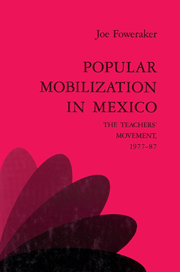Book contents
- Frontmatter
- Contents
- Preface
- Glossary of acronyms
- Introduction: The character and context of popular mobilization in contemporary Mexico
- PART I POPULAR MOVEMENT AND SYNDICAL STRUGGLE
- PART II INSIDE THE MOVEMENT IN CHIAPAS
- PART III NATIONAL MOBILIZATION AND SYSTEM RESPONSES
- PART IV POPULAR MOVEMENTS AND POLITICAL CHANGE
- Bibliography
- Index
Introduction: The character and context of popular mobilization in contemporary Mexico
Published online by Cambridge University Press: 29 September 2009
- Frontmatter
- Contents
- Preface
- Glossary of acronyms
- Introduction: The character and context of popular mobilization in contemporary Mexico
- PART I POPULAR MOVEMENT AND SYNDICAL STRUGGLE
- PART II INSIDE THE MOVEMENT IN CHIAPAS
- PART III NATIONAL MOBILIZATION AND SYSTEM RESPONSES
- PART IV POPULAR MOVEMENTS AND POLITICAL CHANGE
- Bibliography
- Index
Summary
This is the story of the most important popular movement in modern-day Mexican politics – the teacher's movement. From small beginnings in the state of Chiapas in the late 1970s, the movement became a major force in the national politics of the 1980s. At a time when many union organizations faced defeat and despair, the teachers took the lead in combatting the corporatist controls and austerity policies of an increasingly unpopular government. Through their novel forms of organization and their audacious tactics, they captured the national imagination, as well as provoking the opprobrium of government leaders and political bosses; and through their mass mobilizations on the streets of Mexico City they challenged the government's claims to be the revolutionary and democratic representative of the Mexican people.
Teachers are not usually so important, but the special political and cultural legacies of the Mexican Revolution gave Mexico's teachers a central role in the political life of the country. The official teacher's union, the SNTE (The National Union of Workers in Education), is the largest and possibly the most powerful union in Latin America. The teachers organized within it have traditionally acted as one of the principal “transmission belts” of the political system overall, and in their community roles they are the living links the government uses to reproduce the kind of consensus and consent that has been called “hegemonic.” The SNTE is thus one of the key corporate players of the system, and its ubiquitous presence gives it real political muscle. Unlike other syndical corporations, its strength does not derive directly from the federal administration.
- Type
- Chapter
- Information
- Popular Mobilization in MexicoThe Teachers' Movement 1977–87, pp. 1 - 16Publisher: Cambridge University PressPrint publication year: 1993

